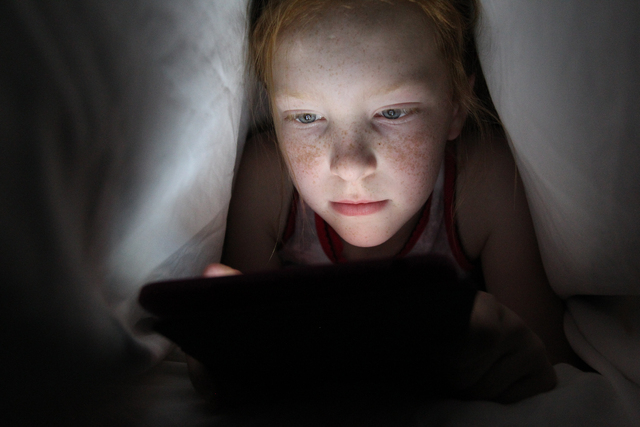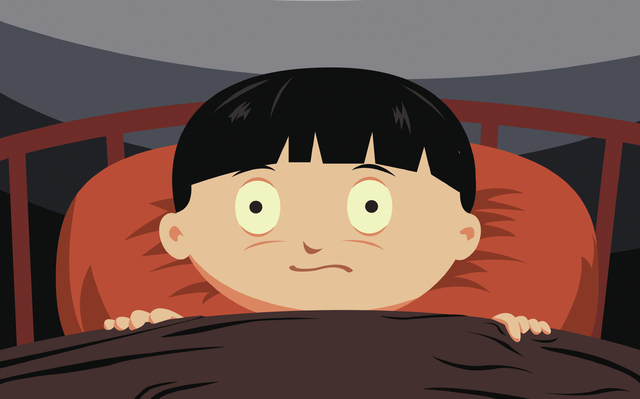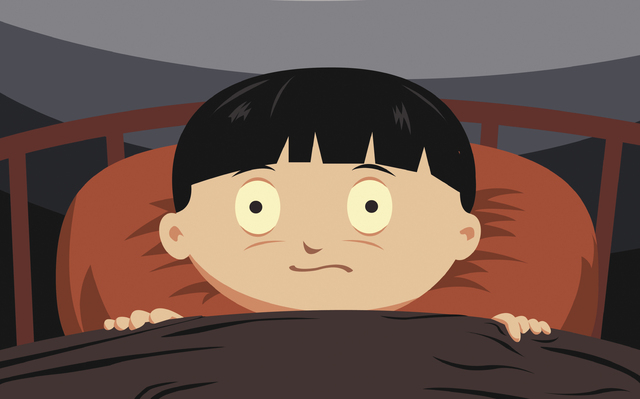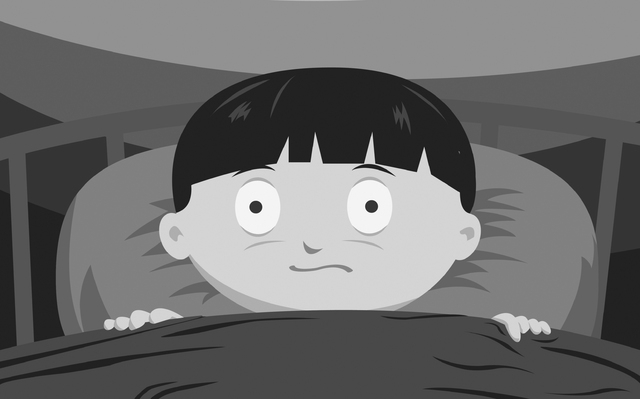Changing hormones, glowing gadgets can leave youngsters sleep-deprived
To put it nicely, some children are not exactly morning birds.
Their visits to the breakfast table are more reminiscent of J.R.R. Tolkien’s surly Gollum in “The Hobbit” — a lot of deep, guttural grunts, incoherent muttering and, if you sit too close, some Cheerios possibly bounced off your head.
But as the synapses start humming and the fog clears, eventually daughter or son pokes through and, again, all is right with the world.
But not always. For some children, the morning grogginess doesn’t wear off so easily and chances are it is an indication of some serious nighttime battles with the Sandman.
A chronic lack of quality sleep can become a serious health problem, no matter a child’s age. Sleep researchers and pediatricians say it has been linked to everything from memory issues and behavioral problems to changes in cardiovascular health.
Unfortunately, parents often don’t make the connection. They may understand what if feels like to suffer the residuals of even one night of bad sleep, but they don’t necessarily see the signs of poor shut-eye in their children.
Sleep can start to fall down the priority list pretty quickly once tykes turn school age and get busier.
“Sleep tends to get compromised. We do a lot of other things in our lives at the expense of sleep and that’s because, I think, a lot of us don’t really appreciate how vital it is to cognition and health,” said Judith Owens, sleep medicine director at Children’s National Medical Center in Washington, D.C.
The health benefits of good sleep for children are undeniable. It allows the body to grow and repair tissues, consolidate memory, and release hormones that regulate growth and appetite, according to the National Sleep Foundation. It also helps them develop a healthy immune system and supports daytime performance and mood.
Long-term insufficient sleep, however, can wreak havoc on the sleep-wake cycle. The hormones that regulate appetite, for example, are likelier to be out of balance.
Studies have linked the risk for obesity and Type 2 diabetes to poor sleep quality. It has also been linked to inattentiveness, diminished memory, behavioral issues, and poor higher-cognitive functions that deal with things such as motivation, judgment and time management, Owens said.
“And, of course, those are skills that are building particularly in the adolescent years, the time when kids are most likely to be chronically sleep-deprived,” she said.
Children who continually suffer from poor quality or inadequate sleep are also likelier to report being depressed. And there are now several studies that show a connection between suicidal thoughts and long-term insufficient sleep.
“So, given the current concerns we have about (teen suicide rates), that is a huge issue,” Owens said.
Just how much sleep are children getting? The National Sleep Foundation recently surveyed 1,103 parents about the weeknight sleeping habits of their children, ages 6 to 17, for its annual Sleep in America poll. While it is recommended children ages 6 to 10 get 10 to 11 hours of sleep, the survey said most are getting an average of nine.
Youth ages 11 to 17 should be getting between 8.5 to 9.5 hours of sleep but the actual reported averages decline with age. By 15, it slips to about seven hours, or 90 minutes less than the foundation’s minimum recommended amount.
One major obstacle to good sleep parents cited was busy evening schedules. This is no surprise when looking at what gets piled onto children’s daily responsibilities, said Nevin Wilson, chairman of the Department of Pediatrics for the University of Nevada School of Medicine.
Wilson, who is also a pediatric allergist/immunologist, noted that one of the chief complaints he gets from his patients, particularly teenagers, is fatigue.
“I take the history and I find out that this guy or this woman is actually like working harder than (a medical) intern, between school and work and hockey and whatever. … Literally, the majority of time with the teenagers I find out they’re really in bed for about four hours. I mean, it’s craziness,” he said.
He added that society has “kind of slid adulthood downward” so that even young children are being burdened with unreasonable schedules that are pushing bedtimes back.
gadget dangers
Another issue is the use of electronics. According to the foundation’s study, about 72 percent of the children, even as young as 6, were reported to have at least one electronic device in their bedroom, such as a television, smartphone or tablet computer.
“We found that the children who would sometimes leave it on after bedtime did sleep less than the children who either always turned it off or didn’t have an electronic device in the first place, so we do think it’s associated with sleep loss,” said Kristen Knutson, a 2014 Sleep in America Poll scholar and investigator with the Sleep Metabolism and Health Center at the University of Chicago.
Electronics in the bedroom means there is a temptation to use them instead of going to sleep, Knutson said. Also, the mental stimulation from the gadgets affects the brain’s ability to wind down.
What many parents don’t realize, she added, is that the light emitted from electronics can inhibit the body’s release of melatonin, a sleep-wake cycle hormone that normally induces drowsiness as the day winds down. By texting or browsing the Internet into the night, children are impeding their ability to fall asleep.
teenage problems
Knutson and Owens noted that as children enter their teen years, there are biological changes that affect the sleep-wake cycle. Melatonin, for example, is released into the bloodstream later in the day, which means some teens find it difficult to fall asleep before about 11 p.m.
That many local high schools start early — that means 7 a.m. — exacerbates the problem, since many of the teens attending the schools are already balancing heavy homework loads and extracurricular activities.
“They’re sort of hard-wired to wake at 8 in the morning when they’ve already been asked to be in school and functioning for say 40 minutes,” Owens said. “So they haven’t even begun to wake up at that time.”
Other factors to consider for children of all ages include caffeine consumption and medications that can interfere with sleep, including antihistamines, Wilson said. While they’re normally associated with drowsiness, antihistamines for some children can have the opposite effect.
Another cause for sleep loss parents should not underestimate is obstructive sleep apnea, a problem that has been increasing among youth, Wilson said. It is often caused by allergies, and viral and bacterial infections. In Las Vegas, especially, the winds and dry climate are notorious for creating a prolonged allergy season.
“The back of the nose and throat swell up, and then when they sleep, they snore like old men,” Wilson said. “The problem is that you have to continually wake up in order to breathe and that turns out to be really bad for you. You see kids … sleeping eight, nine hours, but they’re exhausted and their ability to concentrate in school is terrible.”
He recommends that parents look in on their children while they are asleep to see how well they’re breathing. Snoring or gasping sounds, for example, are signs they need to seek the advice of a pediatrician or family doctor.
it’s time for bed
Parents’ involvement is key to ensuring children sleep long enough and well enough, experts said. Parents should talk to their children about the importance of quality sleep and make it a priority in the family.
Bedtimes should be consistent and the consumption of caffeine, including that found in energy drinks, coffee, chocolate, soft drinks and tea, should be limited and even completely discouraged in the evenings.
Also, the idea that a child sleep-deprived during the school week can make up for it on the weekends is false. Owens compares it to asking the body to adjust across time zones and creating a “semi-permanent state of jet lag.”
Parents should also have a handle on when and how children are using electronics at night, and give specific guidelines for their use. Setting up a sleep-supportive environment can be crucial.
“Having some quiet time and really slowing things down in the hour or half or so before bedtime, get the video games off, maybe some quiet reading, decrease the bright lights, everything that kind of sets the mood for falling asleep,” Wilson said.
If there is any concern about a child’s sleep, parents should talk to a pediatrician, he added, “because it’s not discussed enough.”































